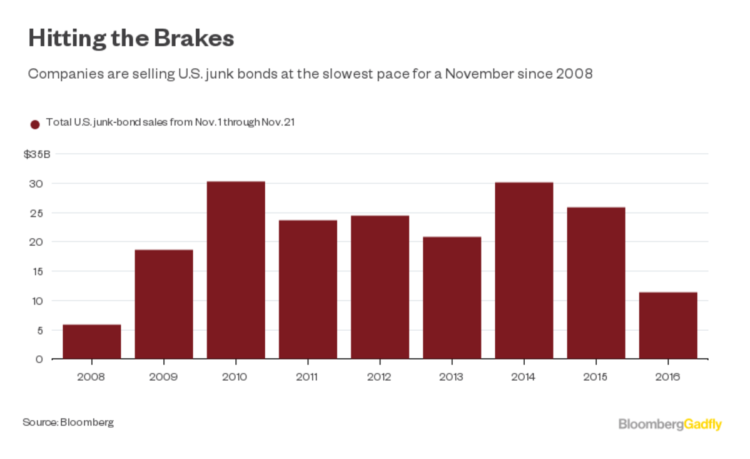That Chill You Feel in the Air Is the Junk-Bond Market: Gadfly

(Bloomberg Gadfly) —The wheels of the $1.3 trillion U.S. junk-bond market are slowly grinding to a halt.
Just a few years ago, the market was as wide open as it had ever been, allowing borrowers to raise money for anything and everything. But times have changed. Even before this month’s U.S. presidential election, companies had already been selling the debt at the slowest pace since 2009, and the surprising outcome has apparently chilled issuance even more.
Borrowers have raised just $11.4 billion so far this month, the least for the period since 2008. While it might be easy to dismiss the development simply as a sign that borrowers have enough money for the foreseeable future, under the surface it seems as if some bigger forces are at work. Investors don’t seem to want to buy junk-rated debt anymore unless they’re amply compensated for the risk.
Consider, for example, a planned debt sale by Conduent, which was spun off from Xerox earlier this year. The new company had about $7 billion of revenue last year. It will provide services to governments and industries, as opposed to selling the photocopiers and scanners that Xerox is known for. While investors were starting to sour on corporate spinoffs last year, they’ve generally warmed to them in 2016, bidding up their U.S. stocks by about 20 percent.So it’s rather surprising that the company apparently failed to sell all $750 million of B+ rated bonds that it had sought out to sell this month. Instead, it had to offer prospective investors substantially higher yields than it had planned while lowering the amount to just $500 million, according to an article on Monday by Claire Boston and Sridhar Natarajan of Bloomberg News. The company also gave investors a discount on a $750 million term loan.
Perhaps part of this could be attributed to Conduent’s plan to use the cash raised from the debt sale to pay a $1.6 billion dividend to Xerox for the spinoff. After all, that doesn’t seem like a particularly productive use as far as bondholders are concerned.
But a more pervasive problem awaits speculative companies that are looking for financing. The difficulties observed may be “just the canary in the coal mine,” Compass Point’s Charles Peabody wrote in a note. Conduent’s difficulties may indicate “growing resistance” to buying junk bonds in a rising rate environment, he wrote.
Since Donald Trump was elected as the next U.S. president, Treasury yields have surged, with traders pricing in a 100 percent chance of the Federal Reserve raising rates next month. The biggest bond investors are increasingly predicting that inflation will pick up. If investors can get higher yields in U.S. government bonds, they may be less inclined to pour cash into highly leveraged companies that have higher default rates and have grown accustomed to years of historically low borrowing costs.
Indeed, high-yield bond funds have experienced withdrawals this month and the debt has declined more than 1 percent. Conduent is just one company that has struggled to meet its financing needs in today’s junk-bond market. But it won’t be the last.
This column does not necessarily reflect the opinion of Bloomberg LP and its owners.
o contact the author of this story: Lisa Abramowicz in New York at labramowicz@bloomberg.net To contact the editor responsible for this story: Daniel Niemi at dniemi1@bloomberg.net



No Comment